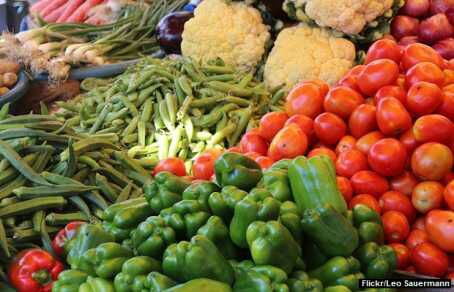Vegetable farming continues to pose a challenge to the people of Sokpoe in the South Tongu District of the Volta Region taking into consideration the rising population growth coupled with dwindling natural resources such as land and the stress posed on water resources by climate change.
Vegetable production is indeed one of the major options that can significantly contribute to food and nutrition security with limited risk associated with expansion of production land.
Vegetables are known to be essential sources of micro nutrients which are critical for reducing high level of malnutrition. However, these potentials are hindered by high post-harvest losses at various stages of the vegetable value chain.
In many surrounding villages around Sokpoe, vegetable production, although widespread, continues to be dominated by women and youth who are the most vulnerable sections of the South Tongu population. The activity therefore is a major contributor to youth employment and a source of stable income for womenfolk especially those around the water bodies.
Definite actions in addressing post-harvest losses in vegetable value chain can stem youth migration as well as reduce the income gap between men and women in the agriculture sector of South Tongu.
On the economic front, a substantial amount of our national income is spent on importation of exotic vegetable products thereby widening the trade balance deficit. The availability of locally produced vegetable products that can compete with exotic ones in our local market (daily, Mini and super markets), will positively impact on balance of payment and improve agriculture contribution to gross domestic product (GDP).
Currently, substantial amount of vegetable products is lost through limited availability of technologies and related infrastructure for post-harvest activities. This negatively impacts on incomes of vegetable farmers and the pursuit for national food and nutrition security.
Post-harvest losses in the vegetable value chain are associated with the perishable nature of the products and this is made worse by the weak links in the post-harvest value chain itself.
Most advocacy for the control of post-harvest losses in the vegetable value chain focuses on the cold chain and its related sophistication. However, for Sokpoe and its surroundings, proper training and orientation of actors within the post-harvest value chain (producers, middle men and women and retailers) and other related infrastructure are more critical than sophisticated machinery geared towards maintaining the cold chain.
Clearly, the inadequate supply of public goods that is largely provided by the public sector perpetuates the high rate of post-harvest losses in the vegetable value chain. Majority of vegetable producing farms are located in remote areas with poor road infrastructure and inadequate transport network.
These conditions are disincentives for effective private sector participation in the vegetable post-harvest value chain, thus, making the cost of transportation expensive for both producers and marketers of vegetables.
Coupled with these are also limited access to electricity and technical know-how for appropriate technologies to facilitate proper vegetable storage techniques and methods.
Realizing the full potentials of the contribution of vegetables in the national economy depends largely on addressing bottlenecks in the post-harvest value chain.
However, limited investments in processing and packaging facilities are a major hindrance in improving quality and lengthening shelf lives of vegetables produced in South Tongu and its surrounding villages. These factors coupled with limited marketing outlets are contributing to product glutting and price volatility.
Majority of farmers produce the same type of crops, harvest around the same time and target the same markets within the district and outside. Consequently, most of the products are not sold and thereby rendered lost or attract prices that provide no economic incentives for producers.
By: Christopher Pappoe/voltaonlinegh.com




